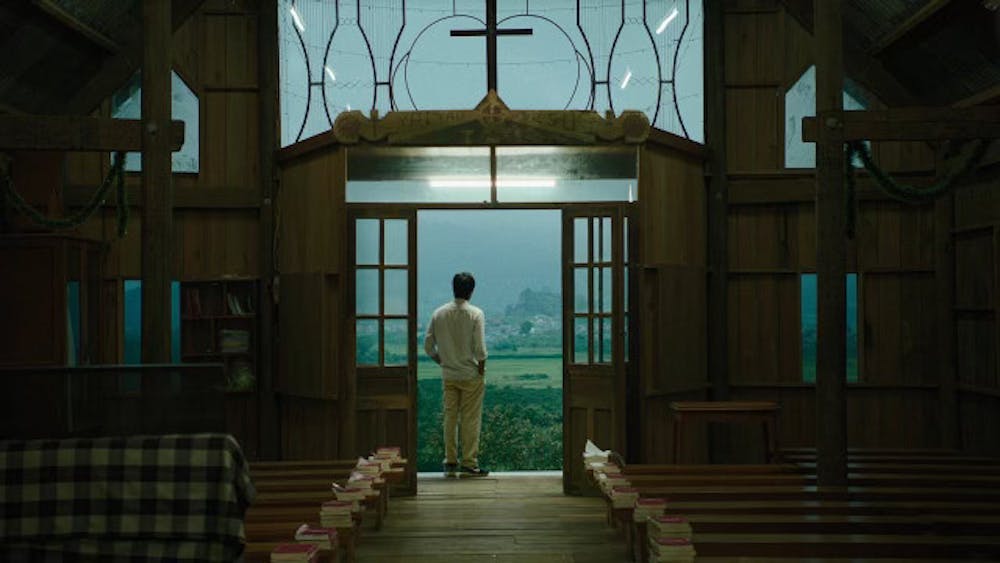“The existence of faith is ambiguous.” These are Thien’s words, a Vietnamese man in his early thirties living a life of meaningless comfort in Saigon — hanging out with friends, soliciting erotic massages — until one day a brutal motorcycle accident leaves him traumatized. This, along with the death of his sister-in-law in a car accident days later, presses Thien with existential questions.
The death of his sister-in-law forces him to become his nephew’s guardian — a little boy named Dao — who he takes back to his hometown in the mountains. There — amidst the funeral processions and the overwhelming Christian sentiment, parade of Christian iconography and hanging Jesus in every home and store — Thien’s endless ruminations on God, faith, death and loss are provoked pointlessly as he finds no answers. He looks everywhere and talks to everyone, but in all of it there is a conviction and knowledge that he doesn’t possess, that he doesn’t know how to attain. The resulting film blends the surreal and the spiritual in a blur of memories, dreams and wandering — a desperate attempt to climb out from “Inside the Yellow Cocoon Shell.”
The feature film debut of Vietnamese director Pham Thien An, “Inside the Yellow Cocoon Shell” dazzles with mystically beautiful long shots that force the audience into Thien’s condition: the emptiness of craving the transcendent and coming up short. The shots are breathtaking, like stills from “Planet Earth”: luscious green mountains and rainforests, dense fog suffocating fields, white butterflies fluttering in the trees. These are the sparse moments when Thien beholds beauty, finds some semblance of meaning in the otherwise meaningless flux of his life. But the majority of these shots take place over conversations where Thien listens silently, almost confusedly, to people who dwell in some higher sphere of fortitude.
Take the very first scene, before the motorcycle accident, where one of Thien’s friends reveals he has decided to move to the mountains and become a monk. Thien barely speaks while his friend defends his decision to commune with the divine: a faith and direction Thien lacks.
Moving forward, Thien sits with Dao at his sister-in-law’s funeral mass, where the priest says the deceased had a “faith comparable to the Virgin Mary." Again, something Thien doesn’t have or understand. Later, he meets a Vietnam veteran who recounts his war stories with zeal and expresses a wish to return to the glory of the battlefield, pointing out his scars with pride. Thien places his finger on one of these scars, in awe and disbelief of the magnitude of such a wound — as if he can’t compute the soul of the man who he’s touching, someone who sacrificed everything and would gladly do it again.
Then there are the several scenes where Thien walks through an abandoned construction site, staring out into the fog, thinking and thinking… (It’s times like these when phone screens flash unexpectedly in the theater as people wonder how much longer the movie will last.)
Desperate, Thien also pursues his older brother, Dao’s father, the same man who ran out on his family years ago. His disappearance burdens Thien with the false hope that finding him will end his confusion and misery.
An old woman points this out to Thien as he waits for his motorcycle to get fixed. She has had a near-death experience, claims to have seen the suffering of souls, and quotes Mark 8:36: “What shall it profit a man to gain the world and lose his soul.” But Thien doesn’t know what to do with this information, rendering him impotent.
By now, Thien’s mind seems to be unraveling as he wanders literally, through the mountains, and unconsciously, through dreams and possible hallucinations, that culminate in his symbolic baptism in a creek at the end of the film. He has just woken from a dream, sleeping on his bike on a farmer’s property with no idea how he got there, when he submerges himself in the water and surrenders to the current. No one knows what happens to Thien: the ambivalent reality of searching for that which cannot be felt or found, only believed in — faith, without reason, a total abandon to God’s will — good, or not.
Devoid of dialogue, the film puts a lot of the work on the audience and, despite winning the Caméra d’Or at The Cannes Film Festival, encountered mixed reviews at Duke’s Screen/Society Thursday, Jan. 25. This I surmised from whispers during the movie, the occasional “Am I missing something?” — also the constant shifting in seats, the heavy sighs and anxious bouncing legs.
Someone shouted “Now that was a movie!” once the credits began to roll. People stared at him like he was an alien, while others murmured violently and shuffled towards the exit. Of course, an official poll wasn’t taken, but if the person sitting next to me, writhing in their seat for the final hour of the movie, suggested anything of the larger feeling of the crowd, I’d say praise was low. A final thought: if a movie makes me suffer, I want the pain to feel good.
Get The Chronicle straight to your inbox
Sign up for our weekly newsletter. Cancel at any time.

